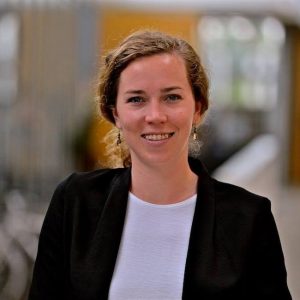This interview features Emma Luker, a 2017 RMES MSc graduate and current Sustainability and Engagement Planner! At the time of this interview (pre-2020), Emma was working as a Planning Analyst in UBC’s Campus + Community Planning Department, with a dual role in the Public Engagement and Sustainability + Engineering units.

What is your current position?
I am currently a Planning Analyst in UBC’s Campus + Community Planning Department, with a dual role in the Public Engagement and Sustainability + Engineering units.
What kinds of responsibilities do you have in your current position, and what kinds of challenges do you face?
My role with C+CP is unique because I have a variety of different responsibilities that I look at from two very different lenses. With Public Engagement I am responsible for planning and developing content for the range of public consultations surrounding UBC’s many, many projects, which I view from a community engagement lens. My other main responsibility is to assist in the ideation and development of emerging policy and plans for the University, such as the Urban Forest Management Plan, through my role with Sustainability + Engineering. I view these responsibilities through a more natural resource management lens, applied at the UBC planning level. The main challenge I face is to juggle these different perspectives when keeping UBC stakeholders informed and ensuring their voices are heard, while also helping to incite sustainable change within the university.
What do you like most about your current job?
I honestly love the pace and the diversity of people I get to work with. I am still relatively new to my position, and so I am still learning who to go to with what question, but being able to find out about the amazing work that goes on behind the scenes at UBC is pretty fantastic.
In what ways did your experience in IRES help prepare you for what you do now?
I think the best way that IRES prepared me for my job was through encouraging me to think critically and to be solution-oriented when looking at problems. So often it can be easy to point out flaws in a plan, which is essential, but to not couple that process with developing a solution is very frustrating. My time with IRES showed me the value of a good argument can be in the solutions it presents, instead of the obstacles.
Why did you choose the RMES program (and UBC)? What was your previous educational background, and how did this influence your choice?
I completed my B.A&Sc at McGill University in Environment and International Development, and was super jazzed about doing a graduate degree that involved international fieldwork that would have an impact on long-term strategies for adapting to climate change effects. At the time I had no idea how broad and idealistic this plan was: What strategies? For whom? What kind of effects? The list of questions goes on and on. I chose IRES because my two potential co-supervisors gave me a structure to work with and provided me with the tools and questions to settle my vision and narrow my scope, which at the time was an incredibly hard thing for me to figure out, but was what I knew I needed.
What was the most enjoyable and/or impactful part of your experience in IRES?
The colleagues that I had the pleasure of working with at IRES made all of the difference. The sense of community and support that came out of my two lab groups made my degree and thesis so much easier to navigate, and I always felt like I had peers who would answer my questions and provide me with very thoughtful feedback. The program management staff at IRES is also stellar, and eased all of the headaches that go along with funding applications, applying for graduation and generally trying to figure out a giant institution while you are just one confused person.
Do you have any advice for current RMES/RES students?
For current students looking for work: the program that helped me the most when looking for work after my degree was the UBC Sustainability and Greenest Scholar program. I was accepted as a Scholar in the summer of 2017 when I was writing and defending my thesis and it was an amazing opportunity to make local connections, do cool research, and get exposed to what it is like working in the public sect if that is something that you are interested in. For current students trying to make the most of your degree: I would recommend reaching out to upper year PhD students and asking for advice on whatever it it is that you are struggling with because they have definitely experienced the same thing at some point. Also join the Student Society! Its a great time and you get the chance to collaborate with new and lovely people who work really hard to make the student experience better for everyone.
Any links to current work you would like to share?
Get involved in the upcoming U Boulevard consultation process! Find out more here: planning.ubc.ca/uboulevard
For more info on Emma’s work and what she’s up to, check out her LinkedIn profile and her master’s thesis.